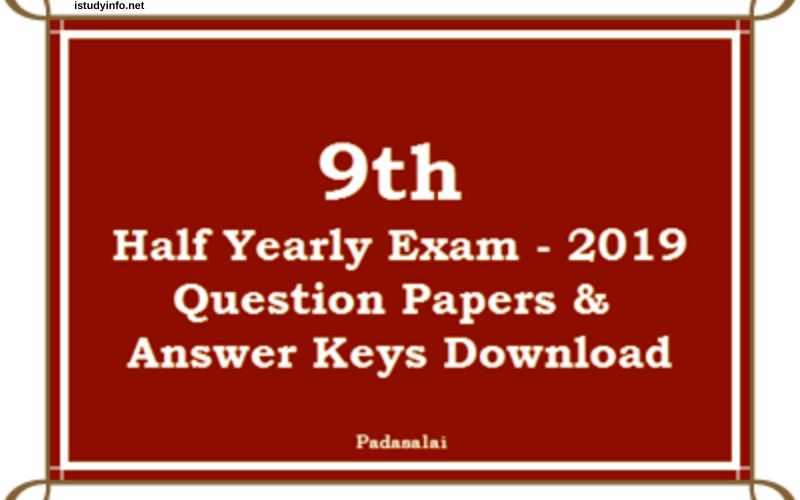As a Class 9 student, the half-yearly exams hold immense significance in your academic journey. These exams serve as a crucial checkpoint, allowing you to assess your progress and identify areas that require further attention. By successfully navigating the half-yearly exams, you can gain valuable insights into your strengths and weaknesses, empowering you to develop a more targeted study plan for the upcoming final examinations.
Acing the half-yearly exams not only boosts your confidence but also demonstrates your ability to retain and apply the knowledge you have acquired throughout the academic year. These exams provide an opportunity for you to showcase your understanding of the core concepts, problem-solving skills, and overall academic prowess. Performing well in the half-yearly exams can also contribute to your overall academic standing and open doors to new opportunities, such as scholarships or advanced learning programs.
Moreover, the half-yearly exams serve as a crucial milestone in your preparation for the Board Exams, which are the culmination of your secondary education. By consistently performing well in the half-yearly exams, you can develop a solid foundation and cultivate the necessary study habits and time management skills required for the final examinations.
Overview of the Half Yearly Question Paper 2019 for Class 9
The Half Yearly Question Paper 2019 for Class 9 was designed to assess your comprehensive understanding of the syllabus covered during the first half of the academic year. This examination aimed to evaluate your grasp of the core concepts, analytical abilities, and problem-solving skills across various subjects.
Syllabus and Topics Covered in the Half Yearly Question Paper 2019
The Half Yearly Question Paper 2019 for Class 9 covered the following subjects and topics:
Subject: Mathematics
- Number Systems
- Polynomials
- Coordinate Geometry
- Linear Equations in Two Variables
- Triangles
- Quadrilaterals
- Areas of Parallelograms and Triangles
- Circles
- Surface Areas and Volumes
Subject: Science
- Matter in Our Surroundings
- Is Matter Around Us Pure?
- Atoms and Molecules
- Structure of the Atom
- The Fundamental Unit of Life
- Tissues
- Diversity in Living Organisms
- Motion
- Force and Laws of Motion
- Gravitation
Subject: Social Science
- The French Revolution
- Socialism in Europe and the Russian Revolution
- Nazism and the Rise of Hitler
- Forest and Wildlife
- Water Resources
- Agriculture
- Manufacturing Industries
- Lifelines of National Economy
Subject: English
- Reading Comprehension
- Vocabulary
- Grammar
- Writing Skills (Formal Letter, Informal Letter, Dialogue Writing, Paragraph Writing)
- Literature (Prose, Poetry, Drama)
Subject: Hindi
- पद
- वाक्य
- रचना के आधार पर वाक्य
- कारक
- संज्ञा
- सर्वनाम
- विशेषण
- क्रिया
- अव्यय
- पत्र लेखन
- अनुच्छेद लेखन
- कहानी लेखन
Exam Pattern and Marking Scheme for the Half Yearly Question Paper 2019
The Half Yearly Question Paper 2019 for Class 9 had the following exam pattern and marking scheme:
Exam Pattern:
- Total Marks: 80
- Duration: 3 Hours
- The question paper was divided into two sections:
- Section A: Objective Type Questions (20 Marks)
- Section B: Subjective Type Questions (60 Marks)
Marking Scheme:
- Section A (Objective Type Questions):
- Multiple Choice Questions (MCQs): 1 mark each
- Very Short Answer Type Questions: 1 mark each
- Section B (Subjective Type Questions):
- Short Answer Type Questions: 3 marks each
- Long Answer Type Questions: 5 marks each
Tips and Strategies for Preparing for the Half Yearly Exams
- Understand the Syllabus and Exam Pattern: Begin your preparation by thoroughly understanding the syllabus and the exam pattern. This will help you prioritize your study efforts and allocate time effectively.
- Develop a Comprehensive Study Plan: Create a well-structured study plan that covers all the topics and subjects. Allocate specific time slots for each subject, ensuring a balanced approach.
- Revise Regularly: Consistent revision is the key to retaining and applying the concepts. Set aside dedicated revision sessions to reinforce your understanding.
- Practice Sample Papers and Previous Year Question Papers: Solving sample papers and previous year question papers will help you familiarize yourself with the exam format, time management, and the types of questions asked.
- Focus on Understanding Concepts, Not Memorization: Emphasis should be placed on understanding the underlying concepts rather than just memorizing facts and formulae. This will enable you to apply your knowledge effectively during the exam.
- Enhance Your Problem-Solving Skills: Dedicate time to solving a variety of practice problems, especially in subjects like Mathematics and Science. This will hone your problem-solving abilities.
- Seek Guidance and Clarification: If you encounter any doubts or difficulties, don’t hesitate to reach out to your teachers or peers for guidance and clarification.
- Manage Your Time Effectively: During the exam, allocate your time wisely to ensure that you can attempt all the questions and provide detailed answers.
- Stay Calm and Focused: Maintain a positive mindset and avoid panic or anxiety during the exam. Take deep breaths and stay focused on the task at hand.
Sample Questions from the Half Yearly Question Paper 2019
Here are a few sample questions from the Half Yearly Question Paper 2019 for Class 9:
Mathematics:
- Simplify the expression: (2x^2 – 3x + 5) – (x^2 + 2x – 1)
- Find the area of a circle with a radius of 7 cm.
Science:
- Explain the process of photosynthesis and its importance in the ecosystem.
- Describe the properties of a magnetic field and its application in our daily lives.
Social Science:
- Discuss the key events and outcomes of the French Revolution.
- Analyze the factors that led to the rise of Nazism in Germany.
English:
- Write a formal letter to the principal of your school requesting permission to organize a charity event.
- Read the given passage and answer the comprehension questions.
Hindi:
- लिंग परिवर्तन के नियम लिखिए।
- निम्नलिखित वाक्यों में कारक चिह्नों का प्रयोग कीजिए।
How to Effectively Manage Time During the Exam
Time management is crucial during the half-yearly exams. Here are some strategies to help you manage your time effectively:
- Thoroughly Read the Question Paper: Before attempting the questions, take a few minutes to read the entire question paper carefully. This will help you understand the overall structure and the distribution of marks.
- Prioritize Questions: Identify the high-scoring and compulsory questions, and start with those. Allocate more time for the longer, high-value questions.
- Pace Yourself: Divide the available time proportionately among the different sections and questions. Use a wall clock or your own watch to monitor your progress and ensure that you are on track.
- Avoid Spending Too Much Time on a Single Question: If you are stuck on a particular question, move on and come back to it later if you have time. This will prevent you from getting bogged down and losing valuable time.
- Plan Your Answers: For subjective questions, take a few moments to plan your answer before writing. This will help you structure your response effectively and save time during the writing process.
- Manage Your Energy Levels: Take short breaks in between sections to recharge and maintain your focus. Staying hydrated and snacking on healthy options can also help you sustain your energy levels.
- Review and Revise: If you have time remaining at the end of the exam, use it to review your answers and make any necessary corrections or additions.
Resources and Study Materials for Preparing for the Half Yearly Exams
To prepare effectively for the Half Yearly Exams, you can utilize the following resources and study materials:
- Textbooks: Refer to the textbooks prescribed by your school for each subject. These books contain comprehensive coverage of the syllabus and provide in-depth explanations of the concepts.
- Reference Books: Supplement your textbook study with additional reference books that offer more detailed information, practice questions, and problem-solving strategies.
- Online Resources: Explore educational websites, virtual learning platforms, and YouTube channels that provide video lectures, interactive simulations, and practice questions.
- Past Question Papers: Solve previous year’s half-yearly and annual exam question papers to familiarize yourself with the exam pattern and the types of questions asked.
- Sample Papers: Practice solving sample papers that mimic the format and difficulty level of the actual exam. This will help you identify your strengths and weaknesses.
- Coaching Classes or Tuition: Consider enrolling in coaching classes or seeking the guidance of a private tutor, especially for subjects that you find challenging.
- Peer Study Groups: Form study groups with your classmates to discuss concepts, solve problems, and share insights. Collaborative learning can be highly beneficial.
- Teacher Consultations: Regularly consult with your subject teachers to clarify doubts, receive feedback on your performance, and gain valuable guidance for effective preparation.
Common Mistakes to Avoid During the Half Yearly Exams
To ensure a successful performance in the Half Yearly Exams, it is essential to be aware of and avoid the following common mistakes:
- Lack of Preparation: Failing to allocate sufficient time for comprehensive preparation and revision can lead to poor performance.
- Careless Mistakes: Rushing through the questions or not double-checking your answers can result in avoidable errors.
- Misinterpretation of Questions: Carefully read and understand the questions to avoid any misunderstanding or confusion.
- Neglecting Important Topics: Overlooking or underestimating the significance of certain topics or chapters can leave gaps in your knowledge.
- Poor Time Management: Ineffective time allocation and pacing during the exam can prevent you from attempting all the questions.
- Anxiety and Stress: Letting anxiety or stress take over can adversely impact your concentration and decision-making abilities.
- Inadequate Revision: Neglecting regular revision and practice can hinder your ability to recall and apply the concepts during the exam.
- Lack of Attention to Detail: Overlooking important details in the questions or in your answers can lead to loss of marks.
Conclusion
The Half Yearly Exams serve as a critical milestone in your academic journey, providing you with an opportunity to assess your progress and identify areas for improvement. By approaching the exams with a well-structured preparation plan, effective time management strategies, and a positive mindset, you can maximize your chances of success.
Remember, consistent practice and a dedication to learning are the keys to achieving academic excellence. Embrace the challenges of the Half Yearly Exams as a stepping stone towards your ultimate goal of success. Good luck!

















Thank you for any other informative web site. Where else may I am getting that kind of info written in such an ideal way? I’ve a project that I’m just now working on, and I’ve been on the look out for such info.